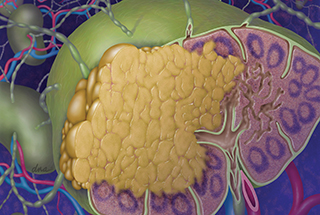| The following article features coverage from the American Society of Hematology (ASH) 2018 meeting. |
CT-P10, a biosimilar to rituximab, was therapeutically equivalent to rituximab as a monotherapy in a phase 3 trial of patients with untreated low tumor burden follicular lymphoma, according to data presented at the 60th American Society of Hematology (ASH) Annual Meeting in San Diego, California.1
After 7 months of treatment, patients assigned to CT-P10 had an overall response rate of 83.1% compared with 81.3% for patients assigned to rituximab (difference of 1.8%; 90% CI, –6.43 to 10.20).
The biosimilar was approved by the US Food and Drug Administration for the treatment of adult patients with CD20-positive, B-cell non-Hodgkin lymphoma as a single agent or in combination with chemotherapy. It is the first biosimilar approved by the FDA for treatment of non-Hodgkin lymphoma. CT-P10 had previously shown non-inferior efficacy in follicular lymphoma when given in combination with cyclophosphamide, vincristine, and prednisone.
In the study, researchers led by Michinori Ogura, MD, PhD, of Kasugai Municipal Hospital, Konan, Japan, randomly assigned 258 patients to CT-P10 or rituximab; 231 patients completed treatment to 7 months. All patients had stage II to IV follicular lymphoma with low tumor burden. Monotherapy was given for 4 weeks as induction therapy, followed by maintenance every 2 months for 2 years.
The two drugs had similar pharmacokinetic profiles with similar trough concentration at each cycle.
Overall, the biosimilar CT-P10 was well tolerated with a safety profile consistent with that reported for rituximab. The majority of patients assigned both drugs experienced treatment-emergent adverse events.
Adverse events of special interest were similar between treatment arms and included infections and infusion-related reactions. No progressive multifocal leukoencephalopathy or hepatitis B was reported in either group.
Reference
1. Ogura M Sancho JM, Cho SG, et al. Comparison of efficacy and safety of biosimilar CT-P10 to rituximab in patients with previously untreated low tumor burden follicular lymphoma (LTBFL): a randomized phase III study. Poster presentation at: American Society of Hematology 60th Annual Meeting & Exposition; December 1-4, 2018; San Diego, CA. Abstract 1596.
This article originally appeared on Cancer Therapy Advisor
